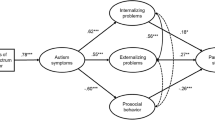Abstract
Data validating the Autism Parenting Stress Index (APSI) is presented for 274 children under age six. Cronbach’s alpha was .827. As a measure of parenting stress specific to core and co-morbid symptoms of autism, the APSI is unique. It is intended for use by clinicians to identify areas where parents need support with parenting skills, and to assess the effect of intervention on parenting stress. Mean parenting stress in the autism group was four times that of the typical group and double that of the other developmental delay group [F(2,272) = 153; p < 001]. An exploratory factor analysis suggested three factors impacting parenting stress: one relating to core deficits, one to co-morbid behavioral symptoms, and one to co-morbid physical symptoms.
Similar content being viewed by others
References
Abidin, R. R. (1983). Parenting stress and the utilization of pediatric services. Children’s Health Care, 11(2), 70–73.
Berry, J. O. (1995). The parental stress scale: Initial psychometric evidence. Journal of Social and Personal Relationships, 12(3), 463–472.
Diggle, T., McConachie, H. R., & Randle, V. R. (2003). Parent-mediated early intervention for young children with autism spectrum disorder. Cochrane Reviews, (1):CD003496.
Eme, R. F. (1992). Selected female affliction in the developmental disorders of childhood: a literature review. Journal of Clinical Child Psychology, 21, 354–374.
Estes, A., Munson, J., Dawson, G., Koehler, E., Zhou, X. H., & Abbott, R. (2009). Parenting stress and psychological functioning among mothers of preschool children with autism and developmental delay. Autism, 13(4), 375–387.
Hartley, S. L., Sikora, D. M., & McCoy, R. (2008). Prevalence and risk factors of maladaptive behaviour in young children with autistic disorder. Journal of Intellectual Disability Research, 52(10), 819–829.
Ibrahim, S. H., Voigt, R. G., Katusic, S. K., Weaver, A. L., & Barbaresi, W. J. (2009). Incidence of gastrointestinal symptoms in children with autism: A population-based study. Pediatrics, 124(2), 680–686.
Johnson, K. P., Giannotti, F., & Cortesi, F. (2009). Sleep patterns in autism spectrum disorders. Child and Adolescent Psychiatric Clinics of North America, 18(4), 917–928.
Leekam, S. R., Libby, S. J., Wing, L., & Gould, J. (2007). Describing the sensory abnormalities of children and adults with autism. Journal of Autism and Developmental Disorders, 37, 894–910.
Liu, X., Hubbard, J. A., Fabes, R. A., & Adam, J. B. (2006). Sleep disturbances and correlates of children with autism spectrum disorders. Child Psychiatry and Human Development, 37(2), 179–191.
Montes, G., & Halterman, J. S. (2007). Psychological functioning and coping among mothers of children with autism: A population-based study. Pediatrics, 119(5), e1040–e1046.
Oster, H., Morales, L., Andersen, R., Wold, C., Simon, P., & Gelberg, L. (2002). The Aggravation in Parenting Scale: Language application issues among Spanish speaking Latino families living in Los Angeles County. Academy for Health Services Research and Health Policy. Meeting. 19:17.
Phetrasuwan, S., & Miles, M. S. (2009). Parenting stress in mothers of children with autism spectrum disorders. Journal for Specialists in Pediatric Nursing, 14(3), 157–165.
Posner, M. I., & Rothbart, M. K. (2009). Toward a physical basis of attention and self regulation. Physics of Life Reviews, 6(2), 103–120.
Silva, L. M. T., Schalock, M. & Gabrielsen (in press). The QST home program: RCT of a parent-delivered treatment for autism. American Journal of Occupational Therapy.
Silva, L. M. T. & Schalock, M. (in press). Sensory and self-regulation checklist: Initial psychometric evidence and findings. American Journal of Occupational Therapy.
Silva, L. M. T., Schalock, M., & Ayres, R. (in press). A model and treatment for autism at the convergence of Chinese medicine and Western science: First 130 cases. Chinese Journal of Integrative Medicine.
Silva, L. M. T., Schalock, M., Ayres, R., Bunse, C., & Budden, S. (2009). Qigong massage treatment for sensory and self-regulation problems in young children with autism: A randomized controlled trial. American Journal of Occupational Therapy, 63, 423–432.
Acknowledgments
The authors wish to gratefully acknowledge the families and early intervention programs that participated in our research. In addition, we wish to thank the Curry Stone Foundation and Northwest Health Foundation whose generous support made this research possible. Finally, we would like to thank Sharon Kadell, Nancy Ganson and Kristen Gabrielsen for their assistance with data collection and project management.
Author information
Authors and Affiliations
Corresponding author
Rights and permissions
About this article
Cite this article
Silva, L.M.T., Schalock, M. Autism Parenting Stress Index: Initial Psychometric Evidence. J Autism Dev Disord 42, 566–574 (2012). https://doi.org/10.1007/s10803-011-1274-1
Published:
Issue Date:
DOI: https://doi.org/10.1007/s10803-011-1274-1



